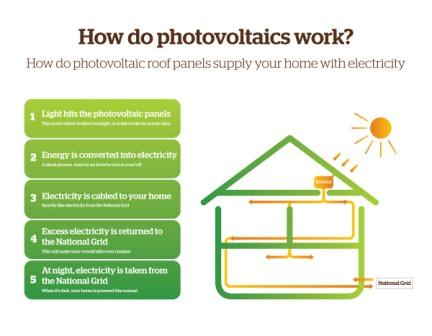A Review of the UK Photovoltaic (PV) Industry and How It Conforms To Governmental Regulations (2013)
Photovoltaic Industry and UK Governmental Regulations Dissertation – Climate change and global warming have become hot topics over the past few years and there has been more publicity and increased general awareness of how our actions, as human beings, can affect the way in which the planet operates. At present, the global population, and in particular the more industrialised countries are very much reliant on fossil fuels. This heavy dependence has led to several environmental concerns such as the depletion of the ozone layer, more unpredictable weather patterns and a generally warmer climate which, in turn, are causing the world’s sea levels to rise.
The construction industry is currently thought to be a major contributor to climate change due to the levels of energy used to manufacture materials, co-ordinate logistics and actually construct each development/project. The end product can also tend to utilise more energy when it is fully operational e.g. housing. New targets have therefore been set by the UK Government to counter this. They aim to generate 10% of all electricity for new build homes from renewable energy sources by 2010 and, by 2016, all new build homes will have to produce zero carbon emissions. In order to achieve these aims, houses will be need to have several micro-generation devices on-site.
These could incorporate solar thermal (solar water heating), solar electric (photovoltaic), heat pumps (ground and air source), wind turbines and biomass (heating systems). Due to time constraints this dissertation will focus primarily on photovoltaic (PV) panels e.g. panels which transfer sunlight into electricity. The theoretical framework of the dissertation addresses how the PV manufacturing industry will be able to meet the UK Government’s ambitious plans to construct 240,000 new homes each year, from 2016, in order to maintain the anticipated demand.
Primary data was gathered from four selected PV manufacturers within the UK. A qualitative methodology technique was used in the form of semi-structured interviews to determine information on manufacturers’ thoughts and feelings on the subject. The results were then analysed for patterns of similarities and dissimilarities with reference to the research questions. The interviews were limited to four due to the difficulty in getting respondents to participate. In light of this, case studies were used to strengthen the relevance of the outcomes. The dissertation will investigate the following aims and objectives:
- To study what the Government is doing to ensure that the energy renewable industry will be able to deliver adequate quantities of photo voltaic (PV) panels for 240,000 new homes each year from 2016
- To examine how the suppliers of these renewable energies will ensure they have an adequate manufacturing workforce in place for 2016
- To examine what the suppliers of these PV panels are doing to ensure they have adequate maintenance workforce to install and service the equipment
- To investigate what the limitations within these industries are and see if they are investing enough money in the PV panel research and development
- To research how the PV manufacturers are trying to differentiate themselves from competitors and increase their market share
- 17,000 words – 60 pages in length
- Excellent use of literature
- Good analysis of subject area
- Well written throughout
- Ideal for construction management students
1 – Introduction
Research Context and Objectives
Rationale for the Study
Aims and Objectives
Research Methodology
Dissertation Structure
2 – The Literature Review
Climate Change
Sustainable Development
Economic
Social
Environmental
Fuel Supply Security
Government Response
2016 The Crucial Date
Code Level 6 Zero-Carbon and Micro-Generation Housing
Implications of code 6 housing and micro-generation
Barriers Facing the Code 6 Housing and Micro-Generation
Objective / Hypothesis
3 – Research Methodology
The Research Process Aims
Method of Choice – Qualitative Research
Qualitative and Quantitative Research Methods
Possible Qualitative Data Collection Strategies
The Interview
Case Studies
Selection
The Interview Design and Guide
The Main Research Questions
4 – Data Analysis
Data Analysis – The Process
Concept Formulation
Identifying Regularities, Relationships and Pattern Recognition
Representativeness of Respondents
Findings
2016 Zero Carbon Housing / Renewable Energy
Ensuring the Workforce Is In Place
Government Intervention
Expanding Their Market Share / R&D
New Technologies
Reflections and Valuation of Problems
5 – Conclusions
How Well Have The Research Questions Been Responded Too?
Reflecting on the Findings and has the Hypothesis Been Met?
Recommendations for Additional Investigation
References

